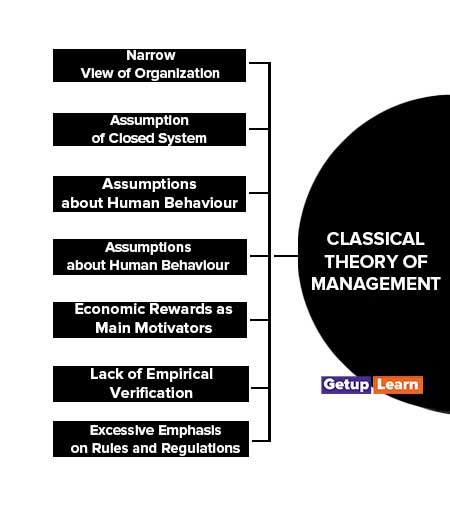Classical Theory of Management
The fundamental objections against the classical theory are discussed below:
- Narrow View of Organization
- Assumption of Closed System
- Assumptions about Human Behaviour
- Economic Rewards as Main Motivators
- Lack of Empirical Verification
- Lack of Universality of Principles
- Excessive Emphasis on Rules and Regulations

Narrow View of Organization
The value of a classical theory is limited by its narrow concentration on the anatomy of formal organization. In order to achieve rationality, the classical writers ignored the human relations aspect.
The interplay of individual personality, informal groups and inter-organizational conflicts in the formal organization were neglected. It is said that the focus of the classical theory is on ‘organization without people’.
Assumption of Closed System
Classical theorists viewed the organization as a closed system, i.e. having no interaction with the environment.
This assumption is totally unrealistic. A modern organization is an open system which has continuous interaction with the environment through the exchange of inputs and outputs and various types of information.
Assumptions about Human Behaviour
Human beings were treated like any other factor of production. They were supposed to obey their superiors. The classical writers ignored the social, psychological and motivational aspects of human behaviour.
Economic Rewards as Main Motivators
The assumption that people at work can be motivated solely through economic rewards is also wrong. Several kinds of research in human behaviour have contradicted this assumption. Non-monetary factors like better status and job enrichment can also motivate workers.
Lack of Empirical Verification
The classical principles are mostly based on personal experiences and limited observations of the practitioners. They are not based on empirical research. They lack precision and a comprehensive framework for analysis. Moreover, it is not clear whether these principles are action recommendations or simply definitions.
Lack of Universality of Principles
Classical theorists claimed that their principles have universal application. This suggests that the same principles can be applied to:
- Different organizations
- Different management levels in the same organization
- Different functions of the same organization. The empirical researches, however, suggest that none of the principles has such characteristics. Moreover, there are many principles which contradict other principles. For example, the principle of specialization is quite in conflict with the principle of unity of command.
Excessive Emphasis on Rules and Regulations
Weber’s ‘ideal’ bureaucracy, a major constituent of classical theory, suggested strict adherence to rules and regulations. The scope for the individual initiative is thus limited.
The result is red-tapism in the organization. Observation of rules and regulations becomes the main objective while the real objectives for which these rules and regulations are formed are forgotten.
What is the classical theory of management?
The following are the classical theories of management:
1. Narrow View of Organization
2. Assumption of Closed System
3. Assumptions about Human Behaviour
4. Economic Rewards as Main Motivators
5. Lack of Empirical Verification
6. Lack of Universality of Principles
7. Excessive Emphasis on Rules and Regulations.













